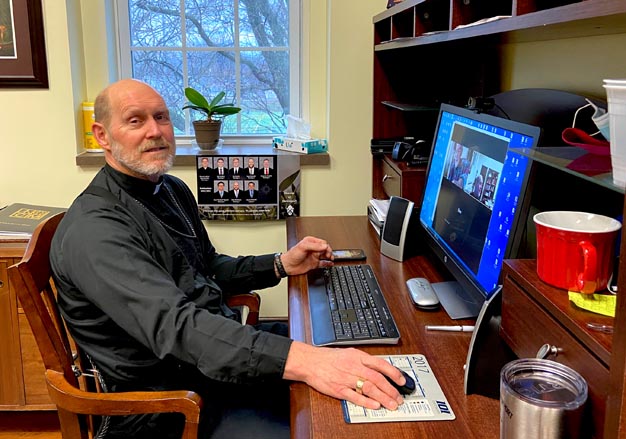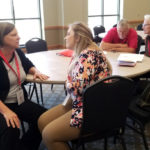
Bishop Thomas Zinkula takes a break from an online meeting. Last week he attended the U.S. Conference of Catholic Bishops fall meeting virtually from his office in Davenport.
By Barb Arland-Fye
The Catholic Messenger
The election of only the second Catholic to be president of the United States results in some opportunities and challenges because of positions that President-elect Joseph Biden holds, says Bishop Thomas Zinkula. He sees the need for the church in the U.S. to take a pastoral approach in interactions with Biden, whose positions support some of the church’s teachings on prolife issues, but not the preeminent one.
Bishop Zinkula spoke with The Catholic Messenger following the Fall General Assembly of the U.S. Conference of Catholic Bishops (USCCB), held online Nov. 16-17. The bishops’ conversation focused on the pandemic and dioceses’ response to it; the sin of racism, and renewal of the bishops’ Ad Hoc Committee Against Racism to address it; and the Vatican report on former cardinal Theodore McCarrick. (See Page 8 for an overview.)
At the end of the meeting, discussion moved to the presidential election, which Biden won. Archbishop José Gomez of Los Angeles, the USCCB’s president, announced creation of a working group to emphasize the church’s priorities and to enhance collaboration with the Biden administration. The working group also aims to help avoid confusion among Catholics about what the church actually teaches.
Archbishop Allen Vigneron of Detroit will lead the working group, which includes “USCCB committee chairmen in a number of areas where disagreement is expected between the church and President-elect Joe Biden.” Following the election of Donald Trump four years ago, critical issues also needed to be addressed, Archbishop Gomez reminded his fellow bishops. “Then as now, the committee existed to address those issues and the goal was to emphasize our priorities and enhance collaboration” (Catholic News Service, Nov. 17). At that time, the bishops identified humane treatment of migrants and refugees as among the critical issues.
President-elect Biden “has given us reason to believe his faith commitments will lead to certain policies that we favor,” Archbishop Gomez said. Those policies include immigration, aid to refugees and the poor, racial justice, capital punishment and climate change. However, Archbishop Gomez also acknowledges that President-elect Biden “will support policies that are against some fundamental values we hold dear as Catholics.”
The president-elect’s support for Roe v. Wade, a Supreme Court decision which legalized abortion, and the possible repeal of the Hyde Amendment, which bans federal funding of abortions with a few exceptions, are among the gravest concerns for the bishops.
Bishop Zinkula said formation of a working group to engage in dialogue with the president-elect and his administration is a good idea because of the possibilities that could emerge. “My thought is that you start out with the opportunities. How can we work together regarding issues on which we are on the same page? How can we support your administration in these areas on which we agree?”
“Then there are the challenges; we need to talk about those challenges, but take a pastoral approach. That’s the way we, as bishops, would approach anyone — Catholic or not — whose views on an issue differ from the church. We talk about church teaching with that individual,” Bishop Zinkula said.
Back in the days when the bishop served as rector of St. Pius X Seminary in the Archdiocese of Dubuque, seminarians referred to his approach as the “sandwich.” Affirm the individual, point out areas in need of change or improvement and finish off with a positive comment. A pastoral approach is appropriate, the bishop added, because Biden “is one of us.”
Some bishops would refuse Communion to President-Elect Biden for his support of Roe v. Wade. Bishop Zinkula believes that is a matter for discussion between the president-elect and his pastor and his bishop. He is concerned about politicizing the Eucharist.
Bishop Zinkula points to Pope Francis, who meets with leaders from around the world, of different religious faiths and beliefs. He collaborates with these leaders in areas where they find common ground, while openly acknowledging differences.











